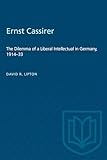Ernst Cassirer : The Dilemma of a Liberal Intellectual in Germany, 1914-33 / David Lipton.
Material type: TextSeries: HeritagePublisher: Toronto : University of Toronto Press, [1978]Copyright date: ©1978Description: 1 online resource (228 p.)Content type:
TextSeries: HeritagePublisher: Toronto : University of Toronto Press, [1978]Copyright date: ©1978Description: 1 online resource (228 p.)Content type: - 9781487577148
- 9781487576370
- 193 19
- B3216.C34 L56 1978eb
- online - DeGruyter
| Item type | Current library | Call number | URL | Status | Notes | Barcode | |
|---|---|---|---|---|---|---|---|
 eBook
eBook
|
Biblioteca "Angelicum" Pont. Univ. S.Tommaso d'Aquino Nuvola online | online - DeGruyter (Browse shelf(Opens below)) | Online access | Not for loan (Accesso limitato) | Accesso per gli utenti autorizzati / Access for authorized users | (dgr)9781487576370 |
restricted access online access with authorization star
http://purl.org/coar/access_right/c_16ec
This probing study of the career, works, and influence of Ernst Cassirer -- a German-Jewish neo-Kantian who taught at the University of Hamburg until Hitler came to power -- analyses his thoughts on human culture as they developed during the turbulent political and cultural conditions in the Germany of his time. The most striking characteristic for Cassirer's life and work was his belief in the freedom of the individual and in the necessary connection between individual freedom and the primacy of reason in human history. Cassirer wanted to pass on his contemporaries the courage to use their own reason. His failure to create the lasting world view based on these ideas reflected a dilemma confronting many liberal intellectuals on the European continent. The author examines several distinct phases in Cassirer's career. Part I deals with Cassirer as a philosopher of Imperial Germany and examines his early neo-Kantian writings (1899-1914). Part 2 covers the years 1914-22 and the reorientation of Cassirer's intellectual standpoint in connection with the issues arising within the German academic community and his reaction to the war of 1914-18. Part 3 covers the Weimar period, 1922-33, observing how Cassirer tried to unite all his past and contemporary intellectual activities with his liberal political ideas in order to create a durable critique of human culture. The final chapter, dealing with the period from 1933 to 1945, when he was a political refugee, presents an epilogue to Cassirer's philosophical career in Germany outlining his hesitant reappraisal of his earlier work in the light of the consequences of the rise and fall of Hitler's Third Reich. An accomplished piece of intellectual history, this book provides a sensitive study of Cassirer's work and its context in the crisis of European civilization between 1914 and 1945.
Mode of access: Internet via World Wide Web.
In English.
Description based on online resource; title from PDF title page (publisher's Web site, viewed 01. Nov 2023)


